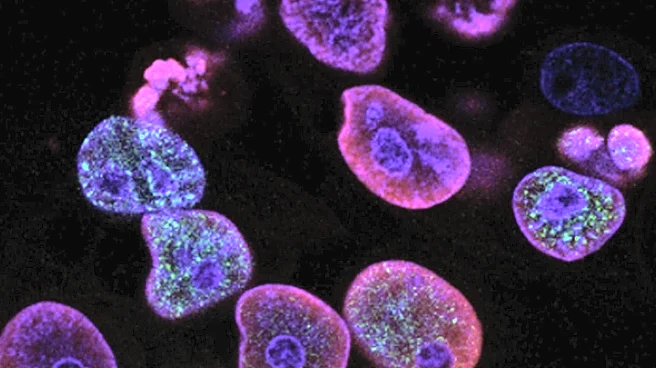What is the story about?
What's Happening?
A recent study has uncovered a mechanism by which chronic Hepatitis B Virus (HBV) infection impairs the function of natural killer (NK) cells, crucial components of the innate immune system. The research highlights that HBV infection leads to NK cell exhaustion, characterized by phenotypic changes and dysfunctions. Specifically, the study found that the glycolysis capacity of NK cells in patients with chronic HBV infection (CHB) is significantly decreased, correlating with impaired activation. The mTOR pathway, essential for NK cell metabolic processes, is inhibited in these patients, affecting glucose metabolism and cytokine production. The study suggests that activating mTOR in NK cells could be a promising therapeutic strategy for CHB patients, particularly those who are immunocompromised.
Why It's Important?
The findings of this study are significant as they offer insights into the immune dysfunctions associated with chronic HBV infection, which affects millions globally. By understanding the role of the mTOR pathway in NK cell function, new therapeutic strategies can be developed to enhance immune responses in CHB patients. This could lead to improved treatments and outcomes for those suffering from HBV, particularly in cases where the immune system is compromised. The development of mTOR agonists could provide new options for managing CHB, potentially reducing the disease's impact on public health and healthcare systems.
What's Next?
The study suggests that mTOR agonists could be developed as potential treatments to restore NK cell function in CHB patients. Future research may focus on the clinical application of these findings, including the development and testing of mTOR agonists in clinical trials. Additionally, further studies could explore the characteristics of different NK cell subsets during chronic HBV infection, which may provide deeper insights into the disease's progression and treatment options.
Beyond the Headlines
The study also highlights the broader implications of immune cell metabolism in viral infections, suggesting that metabolic pathways play a crucial role in immune cell function beyond phenotypic characteristics. This could lead to a paradigm shift in how immune dysfunctions are understood and treated, emphasizing the importance of metabolic reprogramming in therapeutic strategies.















